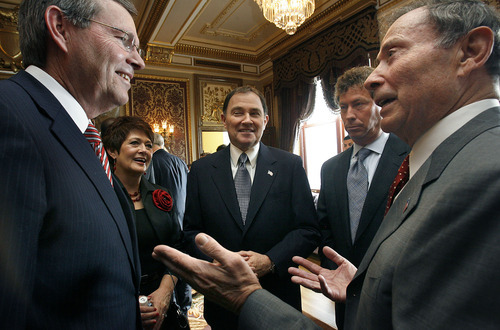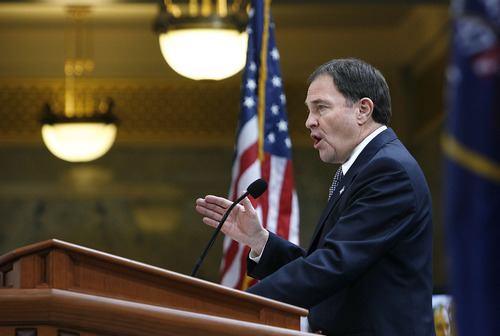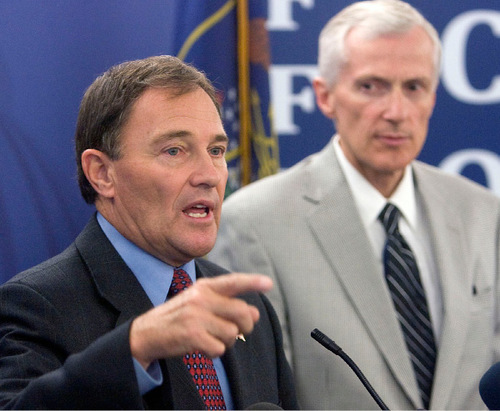This is an archived article that was published on sltrib.com in 2011, and information in the article may be outdated. It is provided only for personal research purposes and may not be reprinted.
Gov. Gary Herbert teed off Tuesday on the Legislature's budget process, which he said is "convoluted" and causes needless concern among state agencies and Utah residents.
"We have a convoluted system up here. It causes a lot of anxiety for people, more so than is needful," Herbert said, speaking to his Education Excellence Commission. "What I think the Legislature is starting to realize is it really does kind of give them a black eye."
The governor's public comments — his sharpest criticism of the Legislature to date — come as lawmakers approach a crucial point in budget deliberations as they begin to restore some of the hundreds of millions of dollars they have slashed from state agencies.
It also reveals some friction in the relationship between the Republican governor, elected in his own right for the first time last November, and the GOP-dominated Legislature.
"There's a lot of confusion out there," Herbert said. "I'm hopeful legislative leadership, Republicans and Democrats alike, will change the rules so that, next year, we don't have to do this."
When asked about the governor's comments, House Speaker Becky Lockhart put her face in her hands and sat silently for about 30 seconds, sighed and said, "I will not apologize for the legislative process."
"We take this very seriously," she said. "We talk to constituents, we talk to interest groups. We talk to the agencies and we make good decisions, and I'm not going to apologize for that to anyone."
In December, Herbert proposed a $10.9 billion budget that maintained level funding for most state government agencies and increases for public education and Medicaid by dipping into the state's rainy-day funds.
The Legislature has taken a different approach, looking to cut 7 percent from state agencies to avoid having to pay for ongoing programs with money that will be gone at the end of the next budget year, then restoring money to the areas deemed most crucial.
"We could make it simpler if you made me king and didn't let the press into our appropriations committees and did it all behind closed doors, kind of like the governor does," said Senate budget chairman Lyle Hillyard, R-Logan. "I always tell people don't panic until we get to the end. It's just a process we have to go through."
It is the latest round in budget sniping, which started shortly after the governor made his budget public.
House Majority Leader Brad Dee, R-Ogden, and Senate Majority Leader Scott Jenkins, R-Plain City, sent a letter to the governor, asserting that his budget proposal violated state law and asking him to try again.
The governor, they contended, had included in his budget a change to tax law, which isn't permitted under the statute. The governor declined to revise his budget, and his agency heads have advocated for Herbert's recommendations in budget meetings.
Herbert said Tuesday the current process is "not an efficient way to do things."
Lockhart readily admits the Legislature's budget process is sometimes bumpy.
That became apparent this week, when the Public Education Appropriations Subcommittee was unable to come to agreement on budget recommendations.
That includes leaving unallocated $91 million in cuts the subcommittee recommended beyond their 7 percent target.
Lockhart said the decisions will be handled by legislative leaders and the body's main budget committee.
"It's sometimes messy and frustrating, but it's the process," she said. "We'll continue to work through the process … and we'll have a budget by the end of the session, and I think the people will be pleased with it." —
Legislative budget writing
Utah lawmakers for several years have passed a base budget early in the session. This bare-bones spending plan is basically a safety net to keep the state government from shutting down if the Legislature couldn't reach agreement on a final budget or a showdown developed between the Legislature and governor.
By rule, approved by both chambers, the base budget bills must be approved by the tenth day of the 45-day session. The rule was instituted after a budget confrontation between former Gov. Olene Walker and the Legislature.







